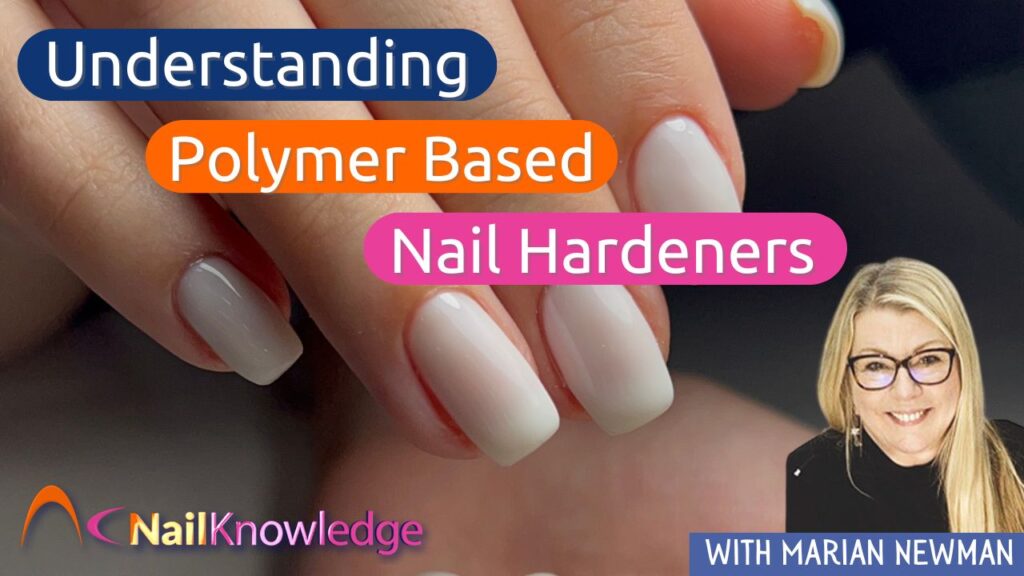Modern nail hardeners that use polymers instead of formalin or dimethyl urea function differently but can still offer protective benefits. Here’s a breakdown of how they work, their mechanisms, and whether they can address issues like recurring splits and peeling.
How Polymer-Based Nail Hardeners Work
Polymer-based nail hardeners generally work by creating a durable coating on the surface of the nail, rather than forming crosslinks within the keratin structure (which formalin and dimethyl urea would do). The polymers used are often acrylics, resins, or other film-forming agents that bond to the nail’s surface, creating a shield that helps prevent physical damage.
This coating:
- Acts as a protective barrier against moisture loss and environmental stressors.
- Reduces the impact of everyday wear and tear, which can weaken nails over time.
- Adds temporary strength and thickness to the nail surface, making it less prone to bending or breaking.
Do Polymer Based Nail Hardeners Form Crosslinks?
No, most polymer-based nail hardeners do not form crosslinks within the nail’s keratin. Crosslinking involves creating covalent bonds within or between keratin molecules, which formalin (a derivative of formaldehyde) does by directly reacting with the proteins in the nail. Dimethyl urea also promotes crosslinking but is less harsh than formaldehyde.
Polymer-based hardeners, by contrast, rely on forming a physical film on top of the nail. This is more of a mechanical barrier than a chemical reinforcement within the nail matrix itself. Some advanced formulations may contain specific ingredients that interact with the keratin surface or enhance adhesion, but they don’t chemically bond in the same way as crosslinking agents.
Effectiveness for Splits and Peeling
For nails that are prone to splitting and peeling, polymer-based hardeners can provide some benefits, but they may not be as effective as crosslinking agents like formalin in the long term.
Here’s why:
- Splits and Peeling: These are often caused by underlying weakness or layering of the nail plate, which crosslinking agents address by strengthening the keratin structure. Polymer-based hardeners might reduce immediate damage by forming a protective barrier, but they don’t address the fundamental weakness that leads to splitting and peeling.
- Temporary Solution: Polymer-based hardeners can help prevent further damage, but they’re more of a temporary fix. Because they don’t change the structural integrity of the nail itself, they may not fully resolve recurring splits and peeling, especially if the nail is already weak or brittle.
- Less Potential for Damage: On the plus side, polymer-based hardeners tend to be gentler and less likely to cause brittleness than traditional crosslinking hardeners, which can sometimes make nails overly hard and prone to snapping. For people with sensitive nails, they may be a safer option for daily use.
Overall Comparison to Formalin-Based Nail Hardeners
While polymer-based hardeners provide surface-level protection, they generally won’t reinforce the nail from within as effectively as formalin-based products. However, they are often safer for long-term use, as formaldehyde-containing products can cause irritation, allergies, and excessive brittleness when overused.
In Summary
- Polymer-based nail hardeners protect the nail by forming a durable coating rather than chemically bonding with keratin.
- They do not form crosslinks within the nail structure, so their effect is more about external protection than internal strengthening.
- While they can reduce breakage, splits, and peeling temporarily, they may not address the root cause as effectively as crosslinking agents like formalin.
- They are, however, generally safer and less harsh on the nails, making them a good option for people with sensitive or already brittle nails.
If you experience recurring splits and peeling, you may benefit from alternating between polymer-based hardeners and a mild crosslinking agent, under the guidance of a nail care professional, to balance strength and flexibility. Additionally, regular moisturizing and maintaining a balanced diet with adequate biotin, vitamins, and minerals can help improve nail health from within.


